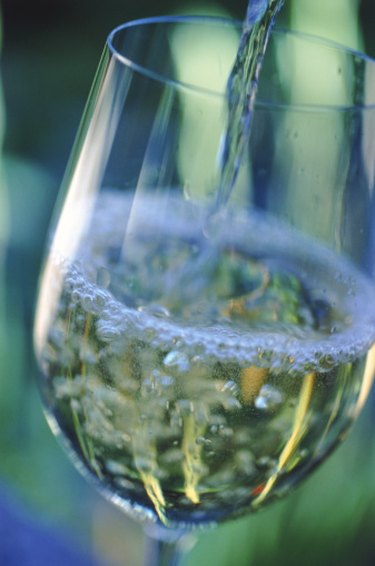
Some people enjoy a glass of dessert wine after dinner. These wines are generally high in alcohol content, often fortified with brandy or another spirit, and are usually sweet to taste. Dessert wines must be stored properly like any other type of wine. The shelf life of an unopened dessert wine can vary based on how it is stored, while an opened bottle is generally good for only a few days if it is re-corked and refrigerated after opening. Proper storage of unopened wine will ensure the longest life and best flavor.
Temperature
Video of the Day
The temperature of the place where you choose to store your wine is very important and leaves little room for error if you are looking for the maximum shelf life for your bottle. According to the Basic Wine Knowledge website, wine stored at improper temperatures for even a few weeks can be affected. The ideal temperature for wine storage is 50 to 55 degrees Fahrenheit regardless of whether it is red wine, white wine, dessert wine or another type. The ideal temperature is derived from French storage practices where wine is kept in caves where the temperature is a constant 55 degrees. A fluctuation of more than five degrees is capable of allowing outside air into the bottle, affecting freshness.
Video of the Day
Light
Wine shelf life can be drastically affected by direct sunlight. Never store your dessert wine in the sun or in any other place where it gets an abundance of light. Many wine bottles are made of dark tinted glass to help keep light out. Ideally a bottle of wine will be stored in the dark or in dimly lit conditions. This is why a wine cellar is such a good place to keep your wine.
Angle
Believe it or not, the angle at which you place the bottle in storage can have a significant effect on the shelf life and resulting taste of the wine. When air gets into a wine bottle it can taint the flavor, and could make the wine lose freshness. When the liquid inside the wine bottle is against the cork it makes it more difficult for air to penetrate the cork. Because of this, it is recommended that you store all wines either horizontally or at a 45-degree angle with the cork facing toward the ground. This will ensure the wine is in contact with the cork and will prevent air from seeping in over time.
Air
Keeping air out is important, but you will never be able to keep it all out. Some air is likely to permeate the cork and get into your wine. To minimize the effects of the air on the wine's flavor you should store wines only in a place with clean air. Storing wine in a musty smelling basement could result in musty tasting wine years later. Places where the air has poor quality or a strong odor should not be used as wine storage areas, or the air could affect the quality of your bottle.